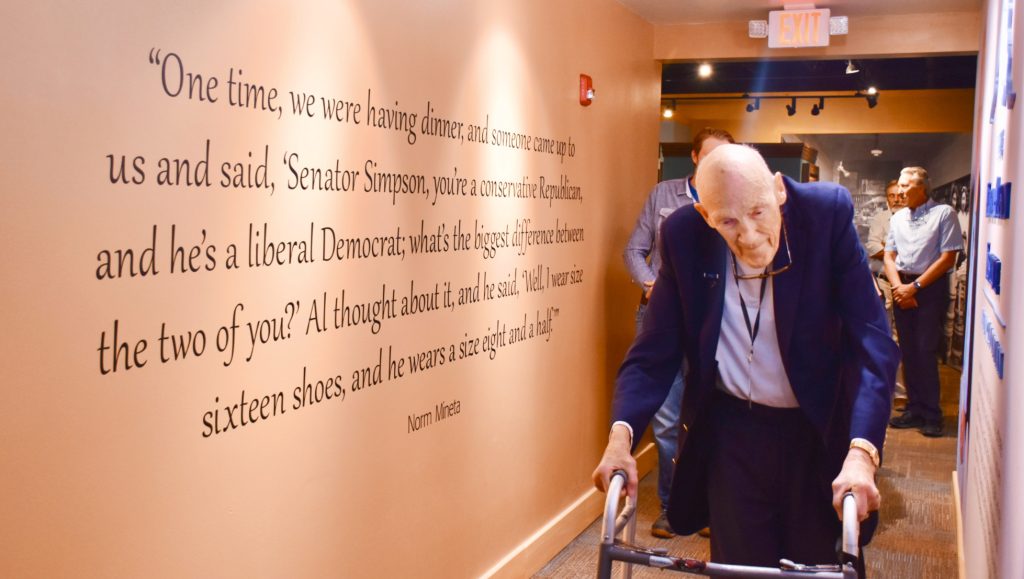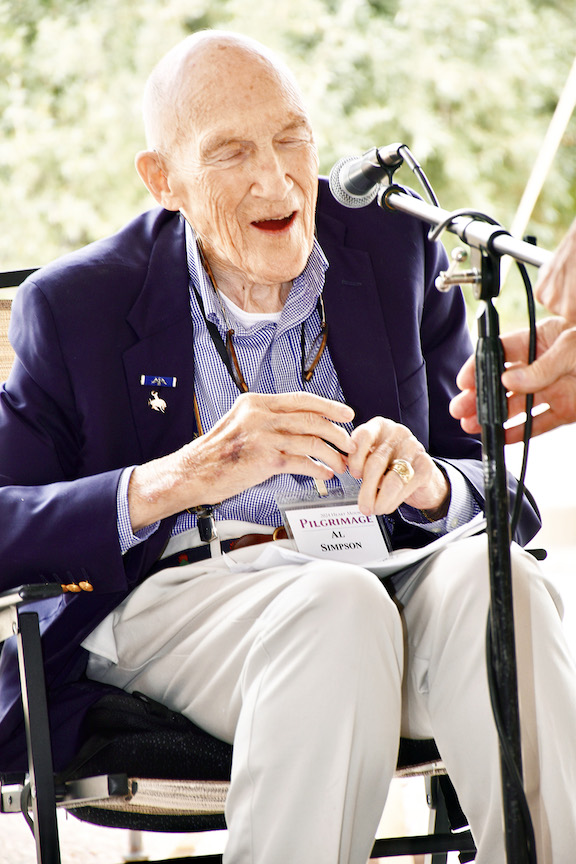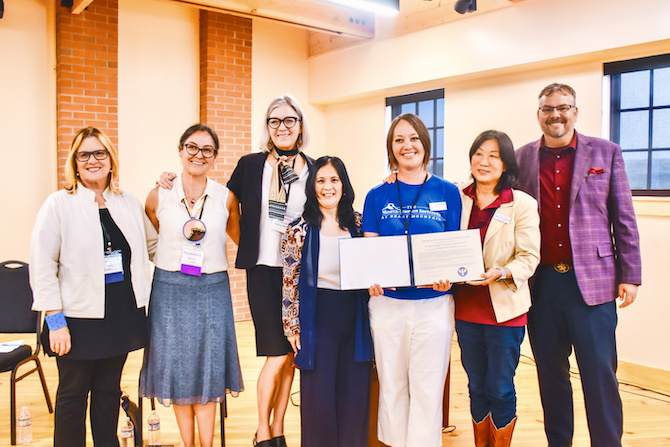
Alan Simpson enters the hallway of the new Heart Mountain exhibit dedicated to the careers of Norman Mineta and his own. (Photo: Heart Mountain Wyoming Foundation)
The opening of the Mineta-Simpson Institute
highlights the 2024 Heart Mountain Pilgrimage.
By Ray Locker, Contributor
More than 400 former incarcerees, family members and guests attended the Heart Mountain Pilgrimage July 25-27 to witness the grand opening of the Mineta-Simpson Institute.
Alan Simpson, a former three-term senator from Wyoming, told the crowd that his old friend, Norman Mineta, would have loved to see the institute and the exhibit dedicated to their lives in public service.

Alan Simpson talks about his friendship with Norman Mineta and the importance of the Mineta-Simpson Institute. (Photo: Heart Mountain Wyoming Foundation)
Named after Mineta, a former congressman and Cabinet member for presidents of two parties, and Simpson, the institute aims to promote the values of civility and bipartisan cooperation that the two men demonstrated while in public service.
Mineta and Simpson first met as Boy Scouts behind the barbed wire at the Heart Mountain concentration camp for Japanese Americans in 1943. They maintained a deep friendship until Mineta’s death in 2022.
Joining Simpson and Deni Mineta, Norman Mineta’s widow, onstage during the July 27 ceremony were former U.S. Rep. Mike Honda, a California Democrat who later held Mineta’s House seat, and Erika Moritsugu, the White House liaison for Asian American, Native Hawaiian and Pacific Islander affairs.
Moritsugu read a proclamation opening the institute from President Joe Biden and presented signed copies to Simpson, Deni Mineta and the Heart Mountain board.
Former Presidents Bill Clinton and George W. Bush, whom Mineta served as secretary of Commerce and Transportation, respectively, also sent video greetings to the pilgrimage.
“In recent years, the nobility of public service has been called into question,” Bush said. “Young people who want to make a positive difference in our society wonder if it’s worthwhile. In my view, the examples of Norm Mineta and Alan Simpson will not only inspire a new generation to enter the area, but it will educate them on how to do it effectively and compassionately.”
“It’s a fitting tribute to two men whose lifelong friendship embodied the very highest American ideals of service, patriotism and bipartisanship,” Clinton said of the institute.
Opening Panel
Shelly Lowe, chair of the National Endowment for the Humanities, joined Anthea Hartig, director of the Smithsonian’s National Museum of American History; Ann Burroughs, president and CEO of the Japanese American National Museum; and Dr. Debra Kawahara, president-elect of the American Psychological Assn., on the first presentation inside the institute. All four panelists stressed the importance of telling the accurate history of the Japanese American incarceration.
The Heart Mountain Interpretive Center became an affiliate of the Smithsonian earlier this year.
Many of the 45 former Heart Mountain incarcerees attending the pilgrimage filled the first two rows inside the institute for the panel, which was moderated by Heart Mountain Executive Director Aura Sunada Newlin.
Graphic Novel Released
The Mineta-Simpson Institute’s opening was accompanied by the release of a new graphic novel by Mineta and Simpson about their careers. “From Behind Barbed Wire to Washington: The Remarkable Friendship of Norman Mineta and Alan Simpson” was written with the help of artist Marie Okuma Johnston and writers Ray Locker and Shirley Ann Higuchi, chair of the Heart Mountain Wyoming Foundation.
Johnston, who’s based in Seattle, said she was grateful for the chance to work on the project.
“What an honor to illustrate the legacies and memories of both the Mineta and Simpson families,” Johnston said. “No words can truly express how much the joy from the families meant to me.”
Simpson and his older brother, Pete, a Heart Mountain board member, said they learned things from the graphic novel, including the fate of workers from Cody, Wyo., who were captured on Wake Island in the Pacific shortly after the Japanese attack on Pearl Harbor. David Mineta, Norman Mineta’s son, also said he learned details about his father’s life that he did not know before the book’s publication.
APA Citation
Kawahara presented the HMWF with a presidential citation from the American Psychological Assn. on behalf of President Cynthia De Las Fuentes for its work to promote improved mental health and understand the effects of long-term mental health trauma.
Kawahara said the HMWF’s Mineta-Simpson Institute has excelled as a “leader in developing empathy, courage and cooperation in the next generation of American leaders.”
Japanese Americans are still uncovering the effects of the incarceration of 125,000 members of their community during World War II because of racism and war hysteria after the bombing of Pearl Harbor by the Imperial Japanese government on Dec. 7, 1941.
About 14,000 Japanese Americans were imprisoned at Heart Mountain during some point in the war. While many rebounded to successful careers in science, law and medicine to become known as a “model minority,” many others carried the shame and stigma of their unjust incarceration. Those feelings have often carried over to successive generations of the community.
The HMWF conducts multigenerational discussion groups and healing circles during its annual pilgrimages and at other forums throughout the year. It also hosts workshops for educators to learn more about the incarceration to share that information with their students.
“I appreciate Dr. Kawahara and Dr. Jared Skillings making the trek out here to Wyoming to celebrate our achievement,” said Higuchi, who is APA’s associate chief of professional practice for justice, legal and state advocacy. “As a longtime APA employee, I’ve discovered how psychology can help resolve trauma and the current effects of societal divisions that the Mineta-Simpson Institute was created to help heal.”
Muller Receives Award
Eric Muller, a University of North Carolina law school professor and author, received the HMWF’s LaDonna Zall Compassionate Witness Award for his scholarship and leadership in creating the permanent exhibit in the Heart Mountain Interpretive Center.
Muller has written four books about the Japanese American incarceration, including “Free to Die for Their Country: The Story of the Japanese American Draft Resisters in World War II.” His latest book, “Lawyer, Jailer, Ally, Foe: Complicity and Conscience in America’s World War II Concentration Camps”, focuses on the often-conflicted roles of camp attorneys during the war.
Tamlyn Tomita Stars in Play
Actor Tamlyn Tomita, a Heart Mountain descendant, led the presentation of “Question 27, Question 28,” a play that uses quotes from Japanese American and Caucasian women connected to the incarceration.
Heart Mountain descendants Vanessa Yuille, a Los Angeles filmmaker, and Mika Dyo, a Los Angeles actor, and Maggie Simpson-Crabaugh, the daughter of Pete Simpson, rounded out the cast, which drew a standing ovation.
First presented in 2004, the play by Chay Yew presents the history of the Japanese American incarceration through the perspectives of the women who were imprisoned in a series of incarceration sites that included one at Heart Mountain.
The play includes the memories of former Heart Mountain incarcerees, such as Amy Uno Ishii, who was later an advocate for redress for the Japanese American incarceration, and other notable women. They include artist and author Mine Okubo, who was incarcerated at the camp in Topaz, Utah, and Yuri Kochiyama, a prisoner at the Jerome, Ark., camp and longtime civil rights activist.

Opening Mineta-Simpson Institute panelists (from left) Ann Burroughs, president and CEO of JANM; Shelly Lowe, chair of the National Endowment for the Humanities; Anthea Hartig, director of the National Museum of American History; Dr. Debra Kawahara, president-elect of the APA; Aura Sunada Newlin, executive director of the HMWF; Shirley Ann Higuchi, HMWF chair; and Dr. Jared Skillings, APA chief of professional practice, with the APA presidential citation (Photo: Heart Mountain Wyoming Foundation)



